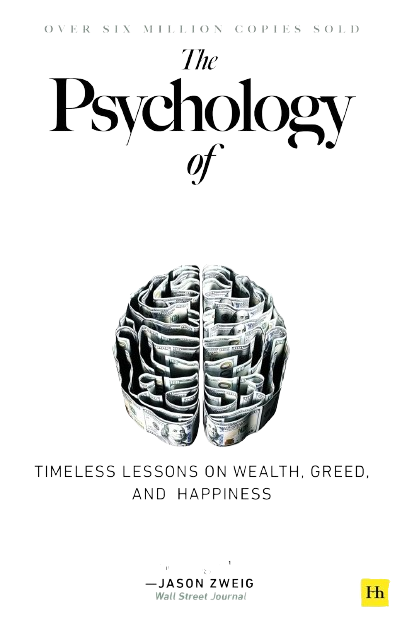 The Psychology of Money by Morgan Housel is a must-read for anyone looking to understand the complex relationship between money and human behavior. Instead of focusing solely on spreadsheets and investment strategies, Housel takes a unique approach by exploring the psychological aspects of personal finance. His insights reveal how our emotions, upbringing, and habits shape financial decisions and outcomes.
The Psychology of Money by Morgan Housel is a must-read for anyone looking to understand the complex relationship between money and human behavior. Instead of focusing solely on spreadsheets and investment strategies, Housel takes a unique approach by exploring the psychological aspects of personal finance. His insights reveal how our emotions, upbringing, and habits shape financial decisions and outcomes.
Whether you’re new to personal finance or a seasoned investor, this book provides timeless lessons to help you rethink your relationship with money, avoid common pitfalls, and ultimately achieve financial peace of mind.
What Makes The Psychology of Money a Game-Changer?
Unlike conventional finance books, The Psychology of Money focuses on how people think about and behave with money. It’s filled with real-world examples, engaging stories, and practical advice to help readers make better financial decisions.
Chapter-by-Chapter Breakdown of The Psychology of Money
1. No One’s Crazy
Housel explains that everyone’s financial decisions make sense to them based on their experiences. Understanding this helps you avoid judgment and opens the door to learning from others.
2. Luck and Risk
This chapter delves into the unpredictable nature of financial success and failure. Housel emphasizes the importance of humility and acknowledging the role of luck in outcomes.
3. Never Enough
Housel warns against the dangers of insatiable greed and highlights the value of knowing when you have “enough.”
4. Confounding Compounding
The power of compounding is simple but often underestimated. This chapter illustrates how time is one of the most valuable assets in wealth building.
5. Getting Wealthy vs. Staying Wealthy
Building wealth and keeping it are two different skills. Housel explores the importance of humility, caution, and consistency to preserve wealth.
6. Tails, You Win
Housel shows how outlier events often drive the most significant results in investing and life. Learning to embrace these “tails” is key to long-term success.
7. Freedom
The ultimate goal of money, according to Housel, is freedom—the ability to control your time and make choices aligned with your values.
8. Man in the Car Paradox
This chapter highlights how people often spend money to impress others, only to realize that no one really notices.
9. Wealth Is What You Don’t See
Housel explains that true wealth isn’t about flashy displays of money but about the assets you don’t spend.
10. Save Money
Simple but profound, this chapter underscores the importance of saving as the foundation of financial security and flexibility.
11. Reasonable > Rational
Being financially reasonable, even if not mathematically optimal, is often the best path to sustained financial health.
12. Surprise!
Housel examines how unexpected events shape financial markets and personal fortunes, encouraging readers to prepare for the unpredictable.
13. Room for Error
Building a margin of safety into your financial decisions helps protect against unforeseen risks and downturns.
14. You’ll Change
Housel reminds readers that their goals, values, and priorities will evolve over time, so financial planning should be flexible.
15. Nothing’s Free
This chapter discusses the “price of admission” for long-term wealth, including patience, discipline, and enduring volatility.
16. You and Me
Financial advice is not one-size-fits-all. Housel stresses that personal circumstances should guide financial decisions.
17. The Seduction of Pessimism
People often gravitate toward pessimistic views, but optimism is essential for long-term success and growth.
18. When You’ll Believe Anything
Housel concludes by exploring how narratives influence financial decisions, urging readers to stay grounded in logic and facts.
Key Takeaways from The Psychology of Money
- Understand your own money mindset and how it impacts decisions.
- Embrace the power of compounding and long-term thinking.
- Avoid the pitfalls of greed and overconfidence.
- Build a margin of safety to protect against financial shocks.
- Prioritize freedom and time over material possessions.
Why You Should Read The Psychology of Money
This book is not just about managing money—it’s about mastering the mindset required to achieve financial well-being and happiness. It offers timeless lessons that apply to anyone, regardless of income level or financial expertise.
Take Action Today
Are you ready to transform your financial mindset and make smarter decisions with your money? Don’t wait for financial freedom to find you—start building it today.
Listen a your copy of The Psychology of Money on Audible for Free and begin your journey toward a healthier relationship with wealth. The first step to financial freedom starts with understanding your psychology—start now!

